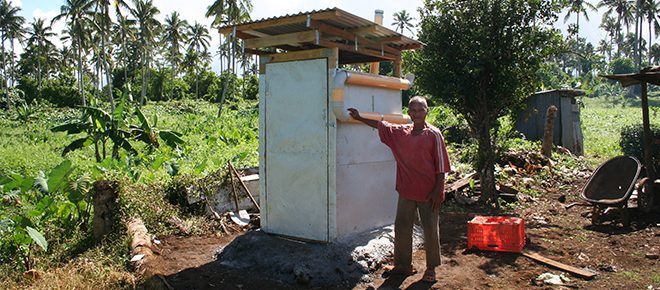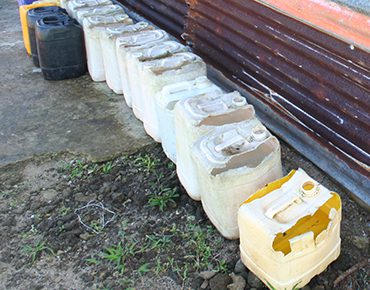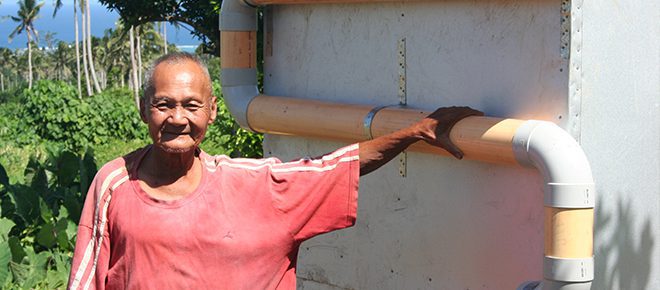For the first time in his life, Siitageo no longer has to fret about collecting water

For the first time in his life, Siitageo no longer has to fret about collecting water.
Siitageo, 71, has been living on the same patch of land for 25 years in Maninoa village, Upolu, growing peas, taro, bananas, yams and cucumbers. He sells his produce to restaurants in Apia and earns around T$200 (NZ$107) a week. He has seven children and lives with the 14 members of his family in two traditional fales. They are built from old pieces of wood, rusting corrugated iron and scraps of building materials that he has found or been given. They offer no protection from the elements.
When Cyclone Evan struck, Siitageo and five of his close family members rushed to shelter inside their rusty old car. The others took refuge in neighbours’ properties. Siitageo says: “I’m used to strong winds, but when Evan hit I ran for the only cover near us, our car, and hoped for the best.
“For four days six of us lived and slept in the vehicle, going outside only to use the toilet and eat. All our crops except the taro were destroyed so we survived by eating coconuts the wind had scattered. Both our fales were completely destroyed.”
Water needs
 Siitageo was fortunate to have money saved from selling his vegetables, which allowed him to buy the materials he needed to rebuild his homes quickly. But his part of the South coast is one of the few remaining in Samoa that lack mains water supply.
Siitageo was fortunate to have money saved from selling his vegetables, which allowed him to buy the materials he needed to rebuild his homes quickly. But his part of the South coast is one of the few remaining in Samoa that lack mains water supply.
Prior to Evan, Siitageo’s family used to collect rain water in open jerry cans stashed under the grooves of his roof. They would fill with water but attract mosquitos and other insects; dogs, pigs and chickens would drink from them and sometimes they would find dead geckoes floating on the surface.
His only other option was to use water from the local spring, 3km away down a steep, muddy track. The return journey would take nearly three hours and have to be made early morning or late evening because of the heat. The family would carry 20 litre buckets, two to a person. His family are fortunate because they have a vehicle, but they had to minimise car trips because they often lacked money for fuel. Collecting water from the spring was a chore shared between the family.
Making life easier
 Funding from EU has enabled Oxfam to help families on the South coast recover from Cyclone Evan.
Funding from EU has enabled Oxfam to help families on the South coast recover from Cyclone Evan.
Oxfam used the money to install a ventilated pit latrine and 3,000 litre water tank on Siigateao’s land. The water tank is large enough for all the family’s domestic needs. It is stabilised by its place on a concrete base stand, which also prevents it warping under the water’s weight. New guttering fixed to a fale roof collects rainfall and guides water flow into the tank. Water is collected from a tap at the base of the tank.
Siigateao feels like a weight has been lifted: “I’m really happy to have a new water tank. We were looking forward to having it installed. When there is water, everything is easy. The health of my children will be better.”
The new latrine is a step up from the family’s last one in numerous ways: this one has a closing door, a toilet seat, a lid and a latch. The pit itself is also very deep. A local WASH innovation is a pipe system that collects rainwater from the roof of the latrine and feeds it down to a tap stand on the side of the latrine. Siigateao’s family can now wash their hands immediately after using the toilet.
“My old latrine was about 20 years old. I used to have to move it every six months or so but this one will be permanent. I am so pleased to have a lid as it means there are no more flies.
“I am very thankful for Oxfam assisting me. I am 71 and for the first time in my life I now do not have to worry about water.”



